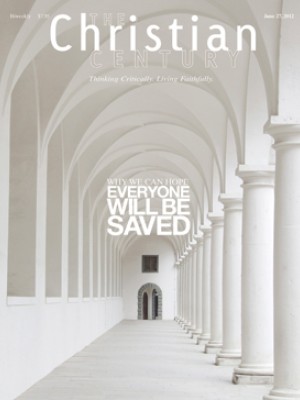Sunday, July 1, 2012: 2 Corinthians 8:7-15
In the languid days of midsummer, when church financial income is at low ebb, it is a comfort to remember that Paul too had stewardship issues in his churches. It’s not a new phenomenon. It turns out that every generation of Christians has managed to find something else to do with their hard-earned money besides offer it to the work of the body of Christ. Every generation of Christians has struggled to balance their own needs and financial security with the needs of the church.
The stewardship sermon is as old as the church itself.
Paul had a problem in Corinth. The collection that he’d been gathering from the churches in Macedonia and Achaea, which was an important symbol of the legitimacy of his gentile mission, had hit a roadblock. It seems that some of the Corinthians were withholding their financial support from the larger church. The year before they’d been eager to lead this campaign for the Jerusalem church, but now their zeal had waned. For whatever reason, their contributions were not living up to their promises. They were sitting on their wallets.
Read our latest issue or browse back issues.
Paul needed a good stewardship sermon.
But he was careful not to threaten or coerce the Corinthians. He did not say that their failure to participate in this collection indicated that they had no part in Christ. He did not say that his words were a commandment, or that the people were required to give in order to be included in the body of Christ and be saved. He made no impossible promises to them. Paul did not suggest that their well-being was in any way tied to their eagerness to contribute. He never said that things would go better with them, that they would be blessed or that any reward would come to them as a result of their generosity. He did not preach the prosperity gospel, that contemporary lie that suggests that if you give to God, then God will give back to you in some divine multiple—as if stewardship were really venture capital with a guaranteed return.
Paul did not manipulate them or threaten them. He never said they had to pay their fair share, or that they owed him something for all he had done for them. He didn’t sell the naming rights to the new fellowship hall in Jerusalem, or offer them a plaque on the communion table or a baptismal font in memory of a grandmother. He didn’t sell bricks on the sidewalk outside the sanctuary in the old city or propose a donor roll to hang in the hallway. He resorted to none of the fund-raising techniques that are commonplace today.
That’s not stewardship. That’s not why we contribute to the work of the saints and the life of the body of Christ. Paul is certain about that.
What Paul does, and does for every stewardship preacher who comes after him, is tell the story. He tells them about Jesus. He rehearses the gospel. He reminds the Corinthians who they are and grounds their generosity in the incarnation. “For you know the generous act of our Lord Jesus Christ, that though he was rich, yet for your sakes he became poor, so that by his poverty you might become rich.” You remember, don’t you, says Paul, that Jesus gave up the power and riches of heavenly glory in order to take on human flesh to set you free, to ransom you from sin and death, to redeem your lives from slavery to the flesh, to make this abundant and blessed and hopeful new life possible for you. Christ left the palace to live with you in the village; he emptied himself of the treasure that was his at the right hand of God in order to make the treasure of his spirit available for all people, even you gentiles.
For Paul and for us, generosity is not a choice we make, not a calculation in which we weigh what we are giving up against what we gain in order make ourselves available to the work of God’s kingdom. It is a mark of our identity in Christ. When we are baptized into the one who is self-emptying we take on that self-emptying generosity for ourselves. It becomes who we are, not what we do. The people of this God, known to us in this self-emptying Christ, are self-emptying people. It is a mark of our union to Christ, who himself laid down his divine glory and became poor for us so that we might know God’s love and grace and redemption.
A congregation that is able to gather the resources to extend itself into the community in new and unexpected ways is not the result of trustworthy leadership or well-executed campaigns. Faithful generosity is a sign of a people who know the gospel, who remember who they are and are determined to follow the self-emptying one and share in the life that Christ offers them.
Our challenge is not stewardship—we are very good at math; we know what we can afford. We can calculate what percentage of our hard-earned money we think the church deserves or needs or can get by on. We know what is in the church budget, where the money goes and what we aren’t able to afford.
Rather, our challenge is about who we are—a people who are a self-emptying people because we are joined to a self-emptying God. Generosity is not a discipline or a spiritual gift: it is part of our character. It is who we become in baptism and who God calls us to be, together, for the further glory of his holy name.





